As Canada and China continue to spar politically–a dispute that has seen two Canadians held in detention for over 600 days and four others sentenced to death in less than two years–activists told a House of Commons committee on Tuesday that time is running out for Ottawa to do something to prevent Beijing from completely shutting down freedom of movement in Hong Kong.
Canada, the activists say, needs to work with other countries to invoke sanctions against Chinese officials for human rights violations and initiate a “safe-harbour program” with an expedited process to grant permanent residence to people from Hong Kong at risk of political persecution.
The calls for tough action from Ottawa come as Canada continues to press for the release of ex-diplomat Michael Kovrig and businessman Michael Spavor–Canadians detained in China just days after Canadian officials arrested Meng Wanzhou, chief financial officer of telecom giant Huawei, at the request of U.S. authorities in December 2018.
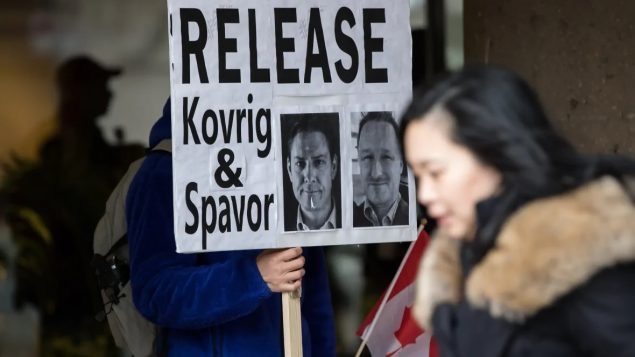
A young man holds a sign bearing photographs of Michael Kovrig and Michael Spavor outside B.C. Supreme Court in Vancouver, where Huawei chief financial officer Meng Wanzhou was attending a hearing, on January 21. The two Canadian have now been imprisoned for over 600 days. (THE CANADIAN PRESS/Darryl Dyck)
Last month, lawyers for Meng asked a Canadian court to stay extradition proceedings against her, claiming U.S. President Donald Trump has “poisoned” the judicial process and undermined its integrity and fairness.
In Ottawa on Tuesday, Alex Neve, secretary-general at Amnesty International Canada, told members of House of Commons special committee on Canada-China relations the best way for Canada to take action is as part of a bigger coalition.
“To go down that road is inevitably going to be much more successful if it’s done on a multilateral basis, that it isn’t just Canada … as one of a very small handful of states pursuing this,” he said.
The session was the first of several scheduled Commons meetings on Hong Kong and came a day after the arrest in Hong Kong of newspaper owner Jimmy Lai.
Lai’s Apple Daily publication has been critical of Beijing as well as a major champion of the pro-democracy movement.
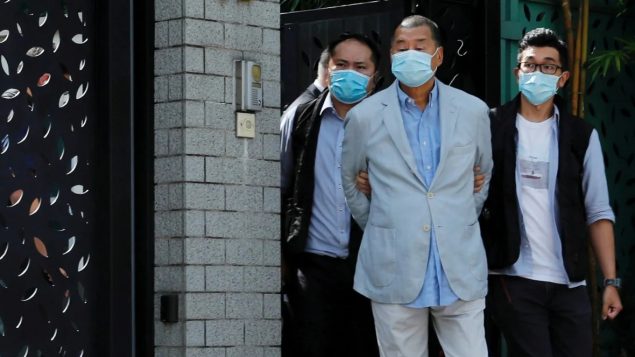
Media mogul Jimmy Lai, founder of Apple Daily, is detained by the national security unit in Hong Kong on Monday. (Tyrone Siu/Reuters)
Lai’s arrest was the latest step in the clampdown against pro-democracy opposition in the city by Beijing, which imposed a sweeping new security law on Hong Kong on June 30, drawing condemnation from Western countries.
Canada has expressed concern about the legislation, which critics say is being used to curb protest and free speech.
And, Ottawa says, the legislation was enacted in a secretive process, without the participation of Hong Kong’s legislature, judiciary or people, and in violation of international obligations.
On Monday, Prime Minister Justin Trudeau said he was very worried about events in Hong Kong and urged Chinese authorities to handle protests there with tact.
“We are extremely concerned about the situation in Hong Kong. We see the need for de-escalation of tensions, we need to see the local authorities listening to the very serious concerns brought forward by Chinese citizens,” said Trudeau, whose country is locked in a trade and diplomatic dispute with Beijing.
“We are calling for peace, for order, for dialogue … we certainly call on China to be very careful and very respectful in how it deals with people who have legitimate concerns in Hong Kong,” Trudeau told a televised news conference in Toronto.
Ottawa suspended an extradition treaty with the former British colony in July and said it would not permit export of sensitive military items to Hong Kong, but activists say more needs to be done.
“It is not enough to call out Beijing’s violations – it is critically and urgently important to put an end to the extraordinary sense of impunity Beijing continues to enjoy for wide-scale state-sponsored human rights violations,” Sophie Richardson, China director of Human Rights Watch, told the committee.
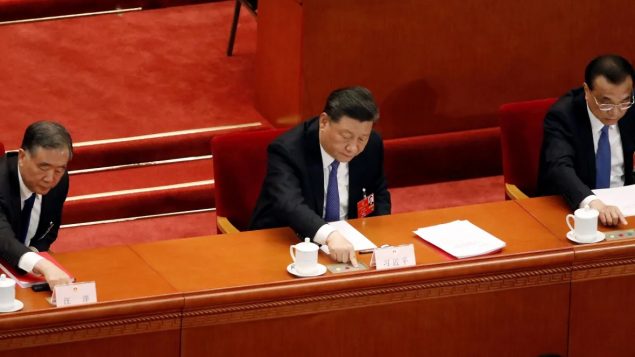
Chinese President Xi Jinping casts his vote in favour of a new security law for Hong Kong at the closing session of the National People’s Congress in Beijing on May 28. (Carlos Garcia Rawlins/Reuters)
Canada-Hong Kong Link President Gloria Fung told MPs it is “way past time” for Canada to show leadership on the world stage by coming up with a strong policy towards China.
Fung called on the federal government to initiate a “safe-harbour program” with an expedited process to grant permanent residence to people from Hong Kong at risk of political persecution.
And, the activists say, more must be done to protect Hong Kong supporters in Canada.
The Canadian Coalition on Human Rights in China said in a report released in May that activists in Canada increasingly face consequences for raising awareness of serious rights issues involving China.
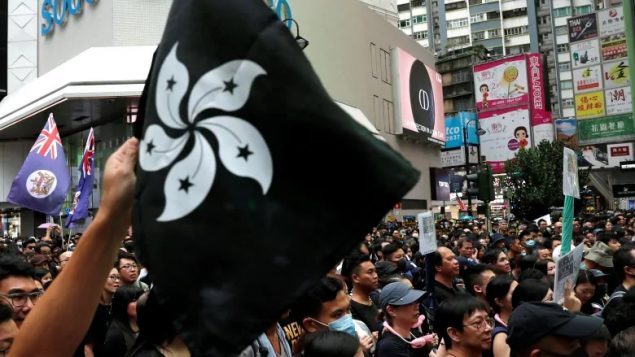
A protester holds a black Hong Kong flag last summer during a rally demanding political reforms in the territory. (Tyrone Siu/Reuters)
The Coalition, which includes Amnesty International Canada, said a number of protests organized by Hong Kong democracy supporters in Canada were met by pro-Beijing counter-protesters who used aggressive, confrontational tactics, and who expert observers believe may be directed or organized by Chinese state authorities.
On Tuesday, Davin Wong, director of youth engagement and policy initiatives at Alliance Canada Hong Kong, an umbrella group of pro-democracy advocates in Canada, pleaded with MPs to consider the deep and long-standing ties between this country and the former British colony.
He noted that more than 300,000 Canadians live there and nearly 2,000 Canadian soldiers fought and died for the territory during the Second World War.
In May, Canadian Foreign Affairs Minister François-Philippe Champagne, the foreign ministers New Zealand, the United Kingdom and the United States issued a joint statement denouncing what they called the Hong Kong government’s unjust disqualification of candidates in legislative council elections.
With files from CBC News, RCI, The Canadian Press, Reuters
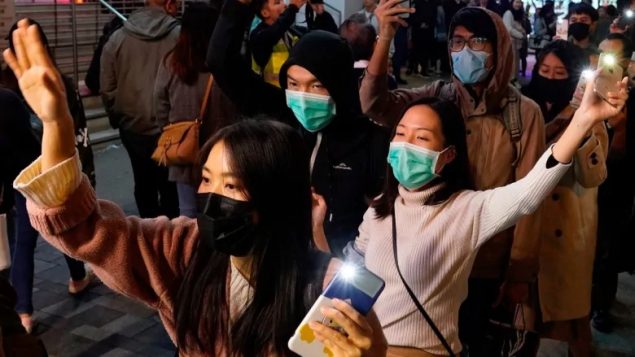






For reasons beyond our control, and for an undetermined period of time, our comment section is now closed. However, our social networks remain open to your contributions.